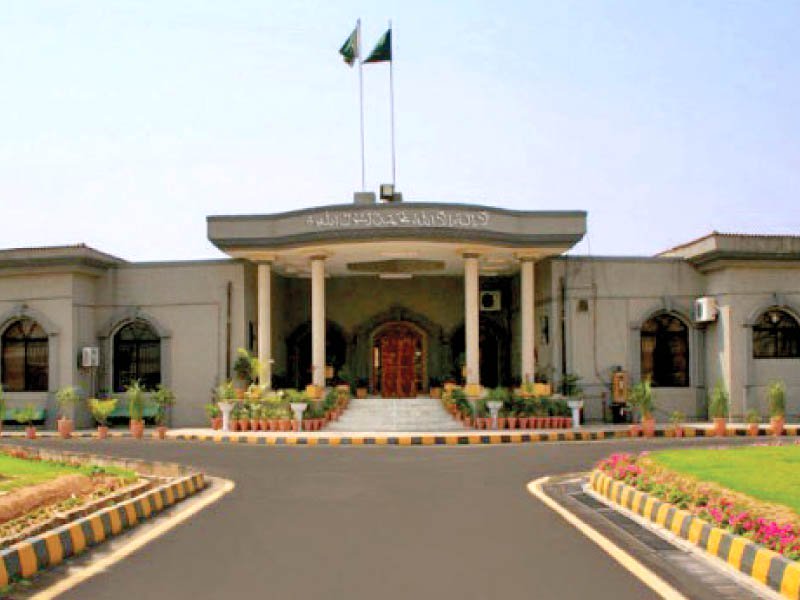
Examining Section 24 of the National Accountability Ordinance (NAO) 1999, the court said that the power of arrest under the law should be exercised justly, fairly, equitably and subject to the principles.
The ruling comes in the judgment in a case filed by two lawyers seeking interpretation of Section 24(d) of the NAO, which empowers the NAB chairman to issue arrest warrants for the accused. The 56-page judgment was authored by IHC Chief Justice Athar Minallah, while Justice Miangul Hassan Arungzaib was part of the division bench which heard the petition.
Zardari to be indicted on March 25 in Park Lane reference
The court notes that presenting the suspects as though they are guilty exacerbates the humiliation which they have already suffered because of the arrest. Such treatment and interference with liberty definitely amounts to infringement of the inherent dignity of a human and thus is a serious violation of inviolability of dignity guaranteed under Article 14 of the Constitution.
“It can cause irreversible damage to the reputation of a person. The social stigma attached with being arrested for an offence under the Ordinance of 1999 can have devastating implications and massive human impact, not only for that person but for the latter's family members as well,” it says.
“The publicity given to the arrest of an accused through press releases issued by the Bureau and any irresponsible reporting in the print or electronic media could ruin lives, including those who at the end of a fair trial are declared innocent,: the judgment reads.
NAB DG reiterates resolve to eradicate corruption
The court said that a suspect cannot be exposed to humiliation unnecessarily as a result of exercising powers excessively or arbitrarily. Sub-Article 2 of Article 14 is a constitutional assurance to every person not to be subjected to torture for the purposes of extracting evidence.
This is most relevant in the context of the expansive powers vested in the Bureau and its Chairman under the Ordinance of 1999, particularly its distinct features relating to the acceptance of plea bargain or the power to allow an accused to become a witness against others, the judgment says.
The court noted that the power of arrest under the NAO should be exercised justly, fairly, equitably and subject to the principles. "Across the board accountability in a transparent manner and free from discrimination and arbitrary exercise of powers is inevitable to meet the challenges faced due to the menace of corruption,” it says.
“Last but not the least is professional training, qualification and expertise of the investigators and prosecutors to deal with white collar crimes. We have no doubts regarding the dedication and integrity of the investigators of the Bureau but they definitely have to be experts and trained professionals to deal with white collar crimes.”
The judgment says that the right to liberty, being a sacred shield against abuse of statutory power vested in an executive authority, must be jealously guarded as the duty of a Constitutional Court. "Abuse, excess or unlawful exercise of authority or power vested in an authority under the law and having the effect of depriving a person from enjoying the right to liberty amounts to a serious violation of the constitutional right guaranteed under Article 9," it said.
The judgment notes that exercise of the power to arrest under section 18(e) read with section 24 of the Ordinance of 1999 would be lawful if the intrusions into the conflicting fundamental rights guaranteed under Articles 9 and 14 of the Constitution could be adequately justified.
It says that it is the duty of authorities vested with powers under the Ordinance of 1999 to treat an accused fairly during the course of the inquiry or investigation because the latter is presumed to be innocent. "No accused must feel that the powers are being exercised indiscriminately."
The verdict stresses that the equal treatment of all similarly-placed accused should be reflected from the manner in which statutory powers are being exercised. "The power to order the arrest of an accused must not be exercised in an indiscriminate and arbitrary manner giving rise to complaints that some are treated less favourably than others,” the judgment said.
“The actions ought to show, unambiguously, that the executive discretion of ordering the arrest is exercised in each case uniformly and without discrimination,” it said. "The foundational principle of structuring of the discretion must be obvious from the actions of the executive authorities which adversely affect fundamental rights."
The court states that if the authority vested with the power to arrest provided under a statute fails to adequately explain its exercise in a way that is manifestly uniform and similar in all cases then it would be an infringement of the right guaranteed under Article 25 of the Constitution.
The judgment also mentions Article 4 of the Constitution, which declares that “to enjoy the protection of law and to be treated in accordance with law” is an inalienable right of every citizen and, in particular, “no action detrimental to life, liberty and reputation shall be taken” except in accordance with law.
"The test is public perception and confidence. Across the board accountability can only be achieved if there is no perception that accused are treated differently. The Bureau must be able to demonstrably justify why some accused are arrested while others are treated differently.
The court notes that in the absence of lawful authority, to justify intrusions into constitutionally guaranteed rights, the detention or incarceration would become 'false imprisonment', which has evolved in the law of tort for the protection of liberty and against abuse of executive power.
It is thus an obligation of the person directing the arrest to discharge the onus by demonstrably justifying that there were no other less restrictive means for the purposes of conducting effective inquiry or investigation, the ruling says.
The court says that deprivation of liberty must be exercised as an exceptional option for the purposes of inquiry or investigation in relation to white collar crimes. "White collar crimes are committed by skilled professionals, most of whom are experts in covering up and erasing the traces when the crime is committed,” the ruling says.
“It, therefore, poses enormous challenges for the investigators. The detection and investigation of offences dealt with under the Ordinance of 1999 requires highly trained professionals having expertise in forensic accounting, money laundering, data mining and data analysis etc,” it adds.
“If the investigator of a white collar crime is unable to conduct effective inquiry and investigation without arresting an accused then it raises serious questions regarding competence and professionalism.”
The court expects that the federal government and the Majlis-e-Shoora (parliament) will consider appropriate measures in order to ensure that the accountability process is effective, transparent and fair and that NAB is strengthened to meet the challenges and achieve the object for which it has been established.
"We also expect from the Bureau to be mindful of the consequences of excessive and arbitrary exercise of power of arrest relating to the constitutional rights, economy, governance system and foreign affairs interests,” the ruling said.
“The corrupt must fear the Bureau while the innocent and honest repose confidence that they would not be wronged and be dealt with fairly. Arbitrary and indiscriminate exercise of power to arrest is in itself abuse of authority having deleterious consequences."

















COMMENTS
Comments are moderated and generally will be posted if they are on-topic and not abusive.
For more information, please see our Comments FAQ